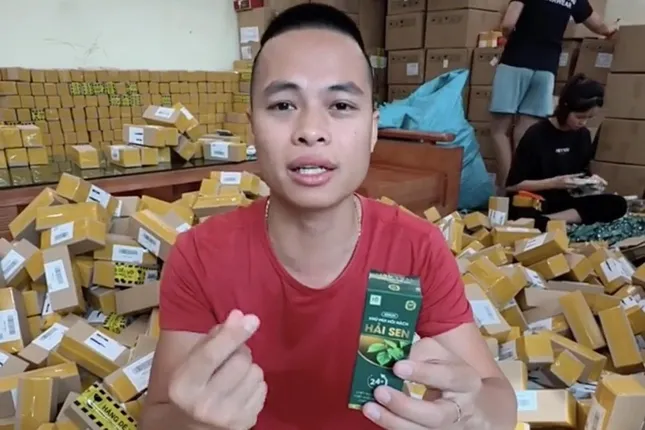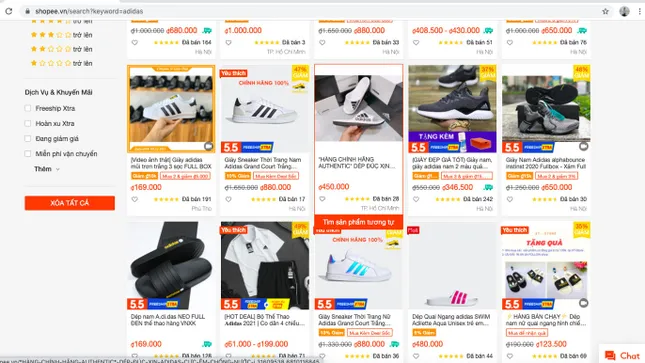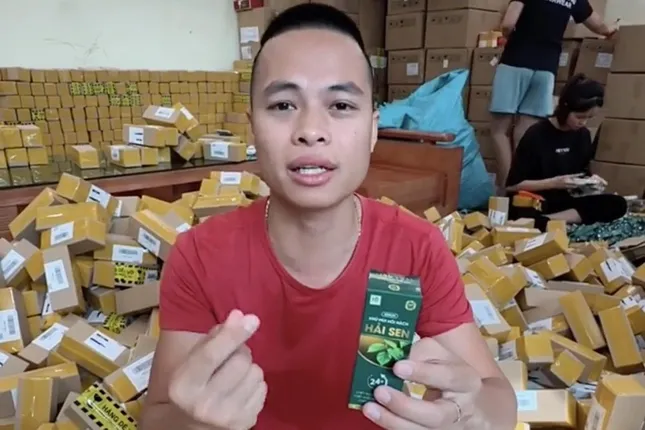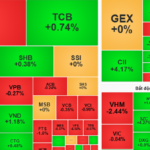“Paradise” for Counterfeit and Knock-off Goods
A series of recent large-scale counterfeiting and knock-off operations have revealed an alarming truth: Counterfeit goods are not only rampant on e-commerce platforms but are also organized and professionally run. By the time authorities discover these operations, the damage has already spread.
One of the most notable recent cases is the Ninh Binh Provincial Police’s arrest and prosecution of Tran Dai Phuc, director of Hai Be Company Limited, and Le Van Hai, a company stakeholder, for trading counterfeit food products.
According to the police, from 2024 until their arrest, Hai Be Company Limited sold over 800,000 products through TikTok Shop, Facebook, and Shopee accounts “Gia đình Hải Sen” and “Hải Sen.” Among these, more than 100,000 boxes of “Hai Be Appetizing Syrup” were sold.
Le Van Hai’s TikTok account, “Gia đình Hải Sen,” had over 2.6 million followers, and his Facebook vlog, “Hải Sen Vlog,” also had a significant following.
When the police raided the company’s headquarters in Van Phu, Nho Quan, they seized hundreds of consignments of cosmetics and functional foods without invoices or proof of origin.

Le Van Hai, owner of the TikTok channel “Gia đình Hải Sen,” sold counterfeit and knock-off goods on a large scale before being busted by authorities.
An analysis of the “Hai Be Appetizing Syrup” revealed that the key ingredients, including Vitamin A, Calcium, and Vitamin C, were only at 70% of the declared levels. According to current regulations, this product is considered counterfeit.
In another case, the Bac Giang Provincial Police busted a facility in Lang Giang District that produced and traded a large number of counterfeit cosmetics, mainly through TikTok and Shopee, earning billions of dong. During the raid, the authorities discovered finished products such as makeup remover, skin creams, acne serum, underarm deodorants, and other items with the brand name “Hải Sen.”
They also seized around 104,000 anti-counterfeit stamps and labels, nearly 10,000 bottles and jars, millions of various packaging, and 300 kg of raw materials, including alum solutions and date-stamping machines.
These cases are just a fraction of the counterfeiting operations that the police are cracking down on. However, the question arises: Why, despite the rampant sale of counterfeit and knock-off goods on e-commerce platforms, do we see only a handful of detections and punishments? Take the TikTok account “Gia đình Hải Sen,” for example; almost every user of this social media platform must have come across it at some point.
Loopholes in the System
In an interview with Tien Phong, Lawyer Nguyen Thanh Hai, director of An Hoang Gia Law Company, attributed the prolonged existence of counterfeiting and knock-off goods on e-commerce platforms to numerous loopholes in the market.
Firstly, there is an issue with seller verification. Currently, most e-commerce platforms allow sellers to register easily with just an email address or phone number. The lack of mandatory electronic identity verification makes it convenient for sellers to change their account names and reappear after being blocked or penalized.
According to the Ministry of Industry and Trade’s report, it is challenging for authorities to determine how many platforms an individual is selling on and to cross-reference information between platforms. This makes inspecting, tracing, and penalizing violations nearly impossible without comprehensive cooperation from the platforms themselves.

Lax management of e-commerce platforms has led to them being dubbed “paradises” for counterfeit and knock-off goods.
Additionally, the lack of control over goods before they are sold allows counterfeit and knock-off products to flourish.
“E-commerce platforms currently only require traders to declare product information and do not have an obligation to verify quality or origin before the goods reach consumers,” Lawyer Hai explained. “In the traditional environment, goods must go through inspection and registration procedures. However, on online platforms, anyone can sell cosmetics, pharmaceuticals, and functional foods under the guise of imported or carry-on goods without providing any proof.”
Lawyer Le Thi Thanh Ha from the Hanoi Bar Association pointed out that the penalties for e-commerce fraud are primarily based on Decree 52/2013 on e-commerce and Decree 85/2021 (amending and supplementing several articles of Decree 52), which are more advisory than punitive. The fines are usually limited to a few million dong, while the revenue from selling counterfeit goods can reach billions of dong per month. Moreover, the lack of a real-time monitoring mechanism means that enforcement always lags.
Notably, according to Lawyer Ha, there is a lack of inter-agency collaboration and data sharing. E-commerce activities involve multiple sectors, including tax, customs, police, the Department of Industry and Trade, and the market management force, but there is no synchronized data-sharing mechanism.
“E-commerce platforms are not obliged to provide real-time transaction reports, making it challenging for authorities to know what to inspect. Additionally, the market management force is relatively thin, and they struggle to keep up with the rapid development of e-commerce, making this market seem beyond control,” Lawyer Ha expressed.
Reflecting on the results of handling violations related to counterfeit and knock-off goods in 2024, Minister of Industry and Trade Nguyen Hong Dien acknowledged that the fight against commercial fraud, especially in e-commerce, has not met the desired goals. He pointed out that counterfeit, smuggled, and untraceable goods are still openly sold in many places, and the violations are becoming increasingly sophisticated and systemic.
Violations involving goods in e-commerce tend to increase. While the number of detected and handled cases has risen compared to the previous year, it still falls short of reflecting the actual situation of violations occurring in the market.
A Proposed Increase to the Minimum Wage: July 2025
“Since the beginning of 2023, electricity prices have surged by over 17% with four separate increases, while the minimum wage for workers has only seen a single raise of 6%.”
“Influencer with Millions of Followers Arrested for Selling Fake Health Supplements”
The Ninh Binh Provincial Police have arrested and prosecuted two individuals for their involvement in the trade of counterfeit food products via social media. One of the accused, Le Van Hai, owner of the TikTok channel “Gia dinh Hai Sen” with over 2.6 million followers, is charged with the consumption of over 100,000 substandard food supplement boxes.
The Dark Side of E-commerce: Unveiling the Illicit Trade on Online Marketplaces
This week’s highlights: Only 2% of goods on e-commerce platforms are legitimate; the International Finance Centre is a playground for the rich; and bad debt risks are expected to continue rising.










































